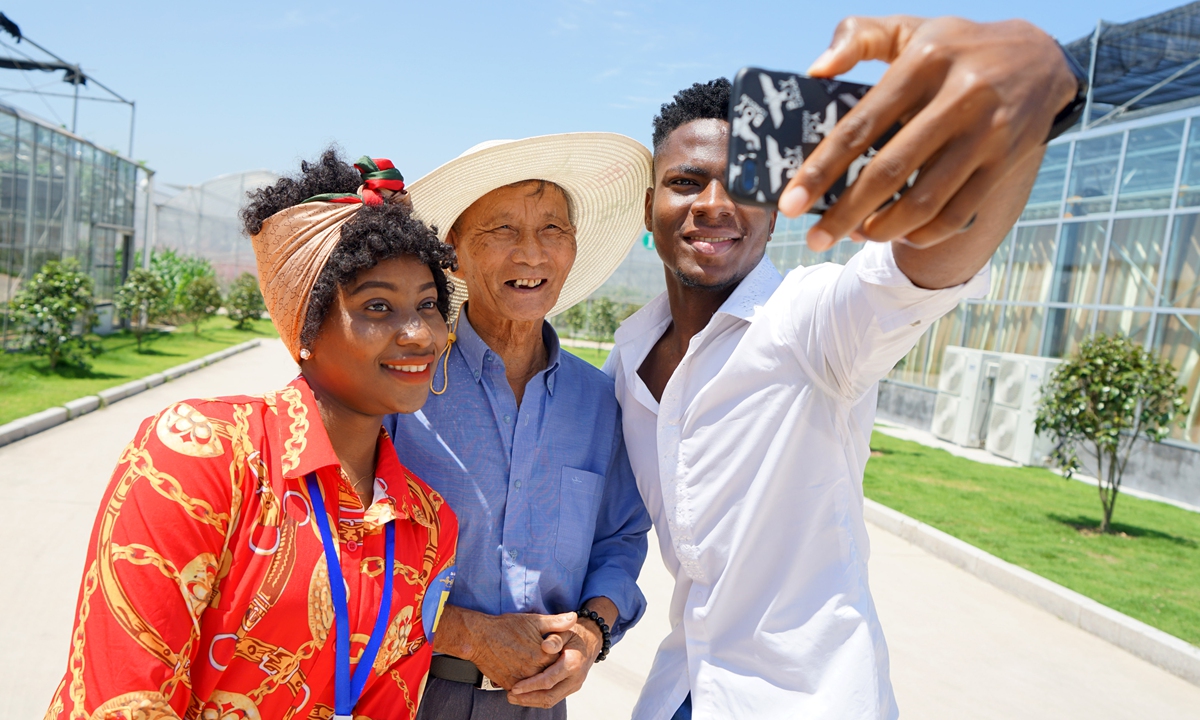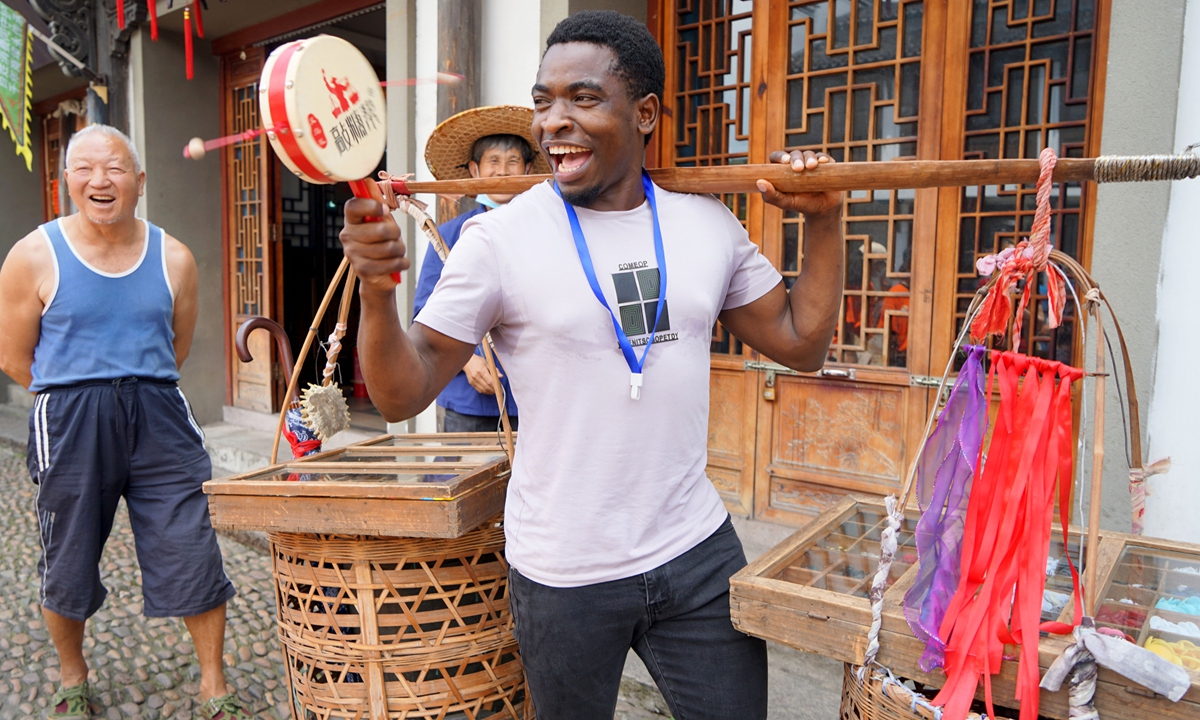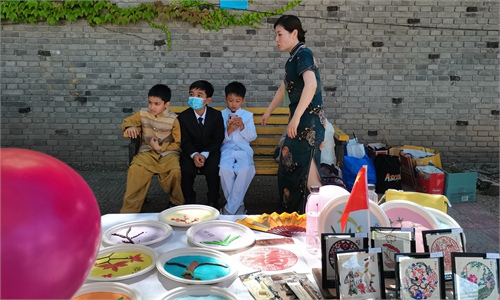Overseas social media influencers visit China's film industry hubs, cheering for the BRI and Chinese culture

Overseas social media influencers visit a high-tech farm in Dongyang city, East China's Zhejiang Province. Photo: Chen Xia/GT
A group of more than 30 overseas social media influencers, from over 20 countries along the Belt and Road Initiative (BRI), travelled during the weekend to Dongyang and Yiwu, two cities in East China's Zhejiang Province, which are famous in the film and television industry, as part of an event named "Daka China".
During the tour, they visited famous tourist sites in the two cities and were encouraged to experience local activities while doing live stream shows or shooting short video clips. With different backgrounds and professions, they agreed on one thing: they are determined to introduce what they see and experience in China, the colorful and real side of the country, to foreigners through social media or other channels.
Ayubu Tewele, a 26-year-old student from Tanzania, had a lot of fun during the trip. He even played an interesting part in a short clip shot in the Hengdian World Studios and dressed up as a traditional Yiwu merchant. However, what excited him the most was the trip to a "smart farm" in Dongyang, where local farmers grow vegetables and fruits using high technology like remote watering and big data monitoring.
During the visit, he asked a lot of questions to the guide including whether all the plants are sowed automatically and how they control the size of fruits.
"What I see is how China has used modern technologies in agriculture and I hope I can introduce some of those technologies to my home country where the weather is suitable for growing fruit but technologies are not ripe," he told the Global Times on Monday.
Currently studying in the Zhejiang Normal University, he often uploads videos and pictures about his life in China on social media platforms where people ask him if China is as interesting as he shows.
"I told them yes, and many of them said they also hope to come and experience the Chinese culture," he said, adding that he wishes them "to know that the real China might be very different from what they imagine or hear of."

Ayubu Tewele, a 26-year-old social media influencer from Tanzania, tries traditional peddling in Yiwu, East China's Zhejiang Province. Photo: Chen Xia/GT
Closer contact
Ayubu, as well as many other overseas social media influencers who were part of the tour, said that they could sense the impact of China's outbound investment and flourishing trade with their countries after China put more focus on business cooperation with overseas countries through campaigns like the BRI.
Ayubu said that one reason why he studied Chinese language is that he felt it would bring him many professional opportunities as many Chinese are doing business in Tanzania, such as mining or running restaurants.
Martina Gdovinova, a social media influencer from Slovakia, also said that Chinese presence has increased in her country in recent years. "For example, some Chinese brands have started to grow popular in Slovakia after opening stores in our country. One of my friends in Slovakia is a fan of Xiaomi. Many of products sold in my home country are also made in China," she told the Global Times.
In particular, the progress of projects under the BRI has helped increase the connection between China and other countries, not only in terms of business projects but by enabling more foreigners to get in touch with Chinese products and culture. In 2020, despite the hit from the pandemic, China traded products worth $1.35 trillion with countries along the Belt and Road route, up 0.7 percent year-on-year, according to data from the Ministry of Commerce.
Rakib Hasan Ark, a social media influencer from Georgia, said that the BRI is a "landmark initiative".
"Everyone is talking about it because this is the future. I believe there is no way of stopping it and is going to have a major impact on the economy of all countries that are a part of it. I am cheering for it," he told the Global Times.
Introducing Chinese culture
Despite the increasing communication and business interaction between China and other countries, all social media influencers said that more things should be done to let other countries understand the culture and life of the Chinese people.
Martina, who has close to 3,000 followers on her Youtube channel, shared numerous videos about her life in China, such as Chinese weddings, Chinese traditional costumes and the Alibaba high-tech hotel. She also has about 470,000 fans on the Chinese video platform, bilibili.com.
Martina said she hopes more students from her countries could learn Chinese language. "Right now, only a very limited number of students in my country can go abroad and study in Chinese universities. I do hope they can have more opportunities to learn the Chinese language so that they can understand China better," she added.
Ammar Albadani from Yemen, currently working in a hospital in Yiwu, has also shared many of China's measures to control the pandemic with overseas audiences.
"I have witnessed how China has developed and dealt with problems through its own methods. In particular, I have witnessed China's success in fighting the pandemic and I want to share this success with people overseas. After living in China for so many years, I think I have the responsibility and right to let overseas people know what is really going on in here," he said.


